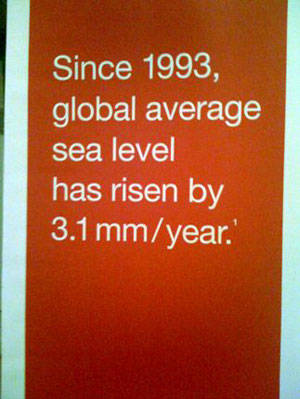Mathematics, Climate Change and Moral Philosophy. A conversation with Balzan Prizewinners
Carbon can be captured and sequestered (CSS) and there is no time like the present to begin this massive undertaking, according to two lectures by Professor Wallace Broecker of Columbia University, Department of Earth and Environmental Sciences last week. Broecker, the Newberry Professor of Earth and Environmental Sciences at Columbia’s Lamont-Doherty Earth Observatory, spoke at the Italian Academy of New York and the Carnegie Institute in Washington last week, two events organized by the International Balzan Foundation.
Before Broecker began his lecture, the Italian Ambassador Giulio Terzi di Sant'Agata spoke eloquently about the role of science in Italy, tracing its history to Galileo and Michelangelo as well as physicist Enrico Fermi. He also spoke of the importance of the International Balzan Prize in promoting the sciences and the arts.
The International Balzan Foundation, an Italian-Swiss foundation gives out four prizes in the sciences and the humanities annually. The foundation was established in 1957 by Lina Balzan to honor her father, Eugenio Balzan. Balzan was a powerful Managing Editor of Corriere della Sera for more than 30 years until he left Italy in conflict with the Fascist regime of Mussolini.
In 1933, he moved his life to Switzerland. The foundation aims to foster culture, the sciences and the most meritorious humanitarian initiatives of peace and brotherhood among peoples.
Broecker, won one of four annual prizes given out by the Balzan Foundation in 2008 for his work on Climate Change. Broecker was very persuasive as he spoke about the need to fix the climate. His major research interest for the past 50 years has been the ocean’s role in climate change. Broecker coined the term Ocean Conveyor Belt, one of the most important discoveries in oceanography in terms of its relationship to climate change.
Broecker also studies past climate fluctuations on the Earth in order to understand current changes.
In Washington, Broecker gave a lecture on his research into fossil fuel while in New York, he shared the platform with two additional Balzan prize winners, Enrico Bombieri for Mathematics and Thomas Nagel for Moral Philosophy.
The three prize winners each spoke about their various fields and tried to speak about practical applications of their research. The event was the first of its kind for the Balzan Foundation in New York. Enrico Bombieri spoke about the use of mathematics in our everyday lives such as GPS systems in cell phones or cars and how important math is to out country’s future. He noted with evident dismay that most Ph.ds in Mathematics did not come from the United States.
Broecker spoke about climate change and fossil fuel in a shorter version of the lecture he developed in Washington while Thomas Nagel of New York University spoke about how difficult it is to have an over reaching theory that can encompass everything.
In his lecture, in Washington, Broecker said that he wished he could live another 50 years in order to see what happens. He noted that the problem of climate change and carbon capture is huge and that people don’t understand how difficult it is to counteract this problem.
U.S. Energy Secretary and Noble Laureate in physics essentially said the same thing in the September edition of Science. Steven Chu noted that, “Roughly 6 billion metric tons of coal are used each year, producing 18 billion tons of CO2. In contrast we now only sequester a few million metric tons of CO2 per year.”
Broecker said it would be ideal if we could replace the energy from carbon with renewable sources but he doubted that that would be possible. Carbon is responsible for 85% of our energy needs. Since we can’t rely on replacing our carbon sources, Broecker concludes that we should rely on carbon capture and storage.
Broecker also mentioned a number of crucial issues that will worsen our current situation: growing population, water scarcity and an expected shortage of food. Broecker made the case to use a new device to capture carbon by using modules created by a fellow scientist Klaus Lackner. He expressed his frustration with the lack of funding for science research through either private or government financing.
The small sums dedicated to science research were disheartening, he noted, that we pay pitchers more than we spend on a problem that affects us all.
Broecker was not catastrophic in his prediction but did say that if we don’t do anything, many species of plants and insects that we know today will change and will perhaps die out. He was hopeful that in the future more work would be done in terms of capturing and burying carbon.
In his lectures, Broecker tried to bring the science behind climate change and what we can do about it to a level that the layman could understand. Science has not been a strong suit in the United States in recent years and much needs to be done to educate the population. According to a Pew Research/AAAS Survey, the public is interested in scientific research and understands basic ideas but has difficulty grasping complex concepts.
The Carnegie Institute and the Italian Academy are each trying to aid in the endeavor of educating the public about the importance of Science, as are many institutions in Italy. Carnegie is celebrating its 20th anniversary of Capital Science evening while the Italian Academy hosted its first annual three- day Science festival this year and a festival on Nanoscience in December 2008.







































i-Italy
Facebook
Google+
This work may not be reproduced, in whole or in part, without prior written permission.
Questo lavoro non può essere riprodotto, in tutto o in parte, senza permesso scritto.